32 foods to lower cortisol levels
The foods that lower cortisol levels include wholegrain and low-fat dairy options, fruit, vegetables, and more


We often think of food as nourishment, a way to 'stay full' so we can go about our day, or as a source of enjoyment. Yet, food can also have a huge influence on unexpected processes in the body - especially those involving our hormones.
Cortisol is one of our stress hormones. When our brains detect danger - whether real or imaginary - we have what's known as a 'fight or flight' response, which then triggers the release of cortisol into the bloodstream. It's a response that can keep us out of danger but everyday minor stresses and even some foods can also trigger the release of this hormone - and the signs of high cortisol aren't pleasant.
Eating high-quality carbohydrates, low-fat dairy products, and plenty of fruits and vegetables may be one of the best ways to lower your cortisol levels. But which ones should you choose?
Spinach
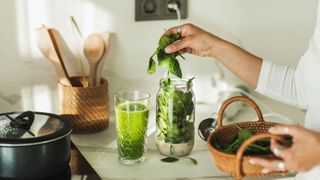
Spinach and other leafy green vegetables like kale are excellent additions to your diet to maintain healthy cortisol levels as it's a food rich in magnesium - and all the benefits that come with it.
Studies by the University of Innsbruck show that low-magnesium diets had a direct anxious behaviour. So, the researchers theorised that including foods rich in magnesium in your diet - such as spinach - may help lower stress levels and help induce a calm state.
Oysters
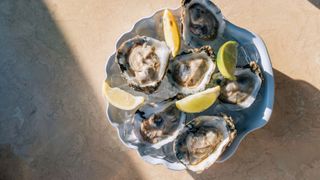
Though perhaps not on your regular shopping list, oysters are another nutrient-rich food for those who want to work on lowering their cortisol levels. Best eaten by the sea on a sunny weekend, of course.
Oysters are rich in zinc, which studies from Shahid Chamran University show is an effective mineral for helping to lower anxiety levels and decrease stress. It does this in part by acting on the γ-aminobutyric acid (GABA) system, which is found in the central nervous system - the same system that controls the 'fight or flight' response.
Sign up for the woman&home newsletter
Sign up to our free daily email for the latest royal and entertainment news, interesting opinion, expert advice on styling and beauty trends, and no-nonsense guides to the health and wellness questions you want answered.
Asparagus
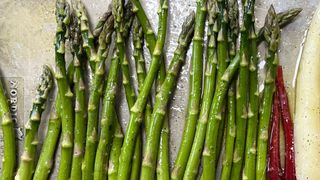
You'll often find asparagus on the list of vegetables to prioritise in your diet - and for good reason. It's rich in vitamins E and K and it's proven to be beneficial for your gut health, which plays a major role in how your brain responds to stress.
Research shows it acts as a functional food - meaning it has "health-giving" properties - and works as an anxiety reliever. The Chinese government has even approved asparagus extract for this use, so you don't even need to eat the whole vegetable to reap the benefits, just the juices.
Mackerel
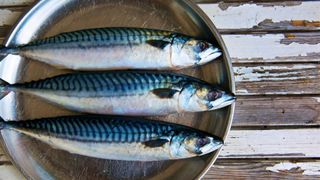
If fish isn't part of your regular diet and you're struggling with signs of high cortisol, you may be missing a trick. Many studies have shown that high levels of cortisol are linked to low levels of omega-3s, a type of fat you can only get from your diet.
Mackerel is one of the best sources of omega-3. These small fish can be purchased fresh or tinned, and they contain 4,580mg of omega-3 per 100g serving - much more than the minimum daily recommendation in the UK.
Chamomile

Chamomile is a popular supplement and herbal tea, famous for its calm- and sleep-inducing benefits. But these aren't just old wives tales, although the herb has been used in medicine for thousands of years. There's plenty of evidence to suggest that chamomile has a real effect on our cortisol levels.
A study from the University of Pennsylvania, for example, found that chamomile extract contributed to a "meaningful reduction" in symptoms of anxiety in research participants over eight weeks - a rate comparable to some anti-anxiety drugs.
Kefir yogurt

By now, we know that our gut can seriously influence our health for better or for worse and having a healthy gut has a direct link to better mental and physical health. Research from Ohio State University reveals a connection between our gut microbiome and our stress levels so by improving gut bacteria you may be able to influence your cortisol levels positively.
There are many gut-healthy foods out there but kefir yogurt - and other fermented foods - is one of the best as it's rich in probiotics.
Salmon
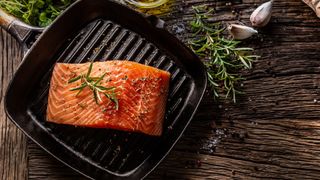
Salmon is one of the best foods to lower cortisol - but it's so nutrient-dense that it can do wonders for all areas of health. It's also a very versatile fish and you can eat it in many different ways to suit your diet.
It's rich in omega-3s, which can help lower our stress levels and contains large amounts of vitamin D, B vitamins, and selenium, which are also all useful for maintaining healthy hormone levels.
Tumeric
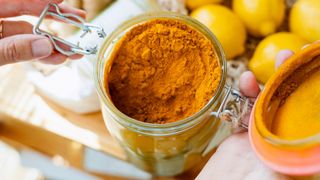
Tumeric is one of the so-called 'healing herbs' - a group that also includes ginger, garlic, chamomile, and ashwagandha. These are known to help lower cortisol levels and increase resilience to stress.
Curcumin is the active compound in tumeric that does this. It affects levels of serotonin and dopamine, two other brain chemicals that control human mood and behaviour, lowering stress and boosting good feelings.
Oats
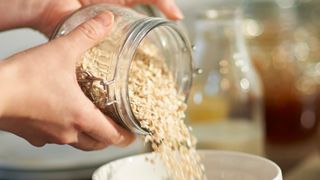
Oats are one of the traditional breakfast options - and for good reason. Not only are they filling - meaning you're less likely to crave sugar-rich foods during the day that can work to spike cortisol levels - they are a wholegrain, one of the best foods for lowering cortisol levels.
Whole grains have all sorts of benefits for the body that can positively contribute to healthy hormone levels, with research from the University of California concluding that these carbohydrates can help to reduce the amount of cortisol circulating in the body and "dampen" our stress-related response to elevated cortisol.
Chicken

Chicken is a protein-rich meat, complete with amino acids that not only help us maintain muscle mass, but also aid in the production of hormones like serotonin. Otherwise known as the 'happy hormone', serotonin works to improve our mood - and importantly, it counteracts the temporary effects of cortisol.
So, the next time you're stressed out and craving a takeaway, opt for a protein-rich meal with chicken instead.
Kimchi
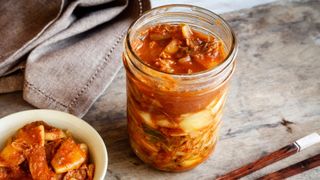
There is a strong link between our brain and gut health, known as the gut-brain axis. While researchers aren't fully clued up on why this connection exists, they know there is one since gut health has a proven, direct impact on mental and physical health. Research shows that those with more 'bad' bacteria in the gut are likely to have higher cortisol levels and experience more feelings of stress, for instance.
Kimchi, along with other fermented foods like sauerkraut and kefir yoghurt, can help the gut maintain a healthy balance of so-called 'good' and 'bad' bacteria.
Rhodiola
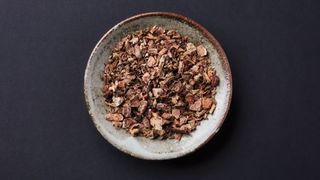
Rhodiola is one of the best foods to lower cortisol but many people have never heard of it. It's a flowering plant that offers herbs and extracts.
The herb is what is known as an adaptogen - a natural product that's believed to stimulate resistance to physical and emotional stress. While the evidence on these is limited, there is plenty of anecdotal evidence on the benefits of these herbs.
Some research does suggest that rhodiola extract may help protect the body's cells from stress-induced damage and regulate heart rate.
Wholewheat cereal
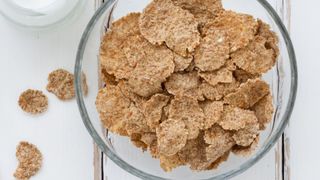
Whole grains are one of the best foods to lower cortisol levels as they provide protective benefits for the body. As well as helping to reduce levels of cortisol circulating in the blood, these grains - which wholewheat cereal is one of - are naturally high in tryptophan. This is an essential amino acid that's important for producing serotonin in the body, known as the 'happy hormone'.
Wholewheat cereal includes Shredded Wheat, Weetabix, Bran Flakes, and puffed wholegrains. However, look out for added sugars included to make the grains taste better. These are best avoided where possible.
Sardines
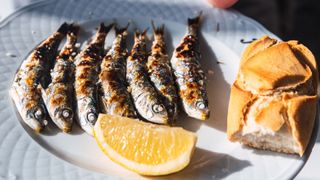
Sardines are small fish that often come preserved in tins. The tins tend to be relatively affordable, making it a great alternative to fresh fish like salmon or mackerel. Although, you can buy sardines fresh as well.
In just 100g of canned Atlantic sardines, you can expect to find 982mg of omega-3 - almost double the minimum recommended daily amount in the UK. Omega-3 is a type of fat you can only get from your diet and several studies have suggested a link between high anxiety levels and low omega-3 diets.
Pitta bread

Pitta bread is another wholegrain, provided you opt for the variety made with brown flour rather than white. This versatile type of bread is great for making sandwiches with and can be a good accompaniment to salads and soups too.
If you can find pitta bread made with rye instead of flour then even better, as this grain is rich in phytochemicals - antioxidants that can help prevent stress-induced cell damage.
Kombucha

The gut and the brain are linked via a gut-brain connection known as an 'axis'. It's a network of nerves, chemical messengers in the brain, and microbes in the gut. Research suggests that maintaining a 'healthy' gut microbiome, i.e. a good balance of 'good' bacteria and 'bad' bacteria is key to good mental and physical health.
Much like kefir yoghurt and sauerkraut, kombucha is an excellent nutritional source for the gut as it contains antioxidants and live bacteria called probiotics, which boost the health of cells in the intestines.
Brown rice
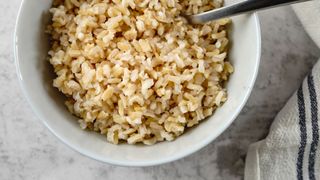
Brown rice is best over white varieties if you're looking to lower your cortisol levels. As a wholegrain food, it can help to limit the amount of cortisol circulating in the bloodstream. These grains are also very high in pyridoxine - a type of vitamin B.
Also known as the 'anti-stress" vitamin, pyridoxine specifically helps regulate the cortisol production when we're under pressure.
Kale

Rich in magnesium, one of the best nutrients to help lower your cortisol levels, kale is a choice to reap added health benefits from your meals. Magnesium helps to keep the body's stress levels in check by controlling certain neurotransmitters in the brain linked to our mood. It's also rich in dopamine-boosting folate, another important nutrient.
It can also help you sleep - one of the key influencers on cortisol levels. The less good-quality sleep you have, the higher your cortisol levels are likely to be, according to research from the University of São Paulo.
Brussel sprouts
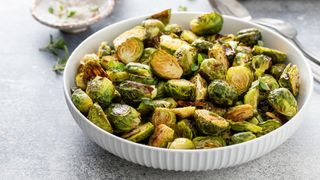
Brussel sprouts are more than a seasonal favourite - they are packed with health benefits. These mini cabbage-looking vegetables can help support your heart health, research shows, and your gut health. Gut health and brain health go hand-in-hand - if the balance of 'good' bacteria and 'bad' bacteria in the gut is off then you may be prone to higher cortisol levels.
There's also an impressive 80mg of dopamine-inducing folate in just 80g of brussell sprouts, an important mineral that can help counteract cortisol levels in the body.
Wholemeal crackers
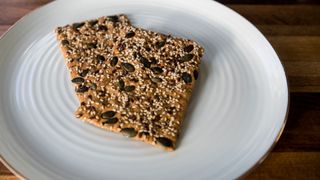
When dealing with high cortisol levels, it's best to eat a balanced diet rather than restrict your food intake. In fact, research shows that many people's cortisol levels rise when they take on a restrictive diet - even without meaning to.
If you're under pressure, you may forget to eat. Having crackers on hand (wholegrain or oatcakes, of course) is a good way to keep your energy levels up and stress levels down.
Anchovies
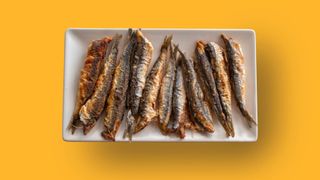
Anchovies, with their salty taste and unique texture, may not be to everyone's liking. But if you are a fan of these small fish then we have good news for you - they may help to lower your cortisol levels as they're rich in omega-3s, niacin, and selenium, all of which can help keep your hormones healthy.
In 100g of tinned anchovies, there is 2,053mg of omega-3s. That's well over what one person should consume as a minimum in the UK every day.
Quinoa
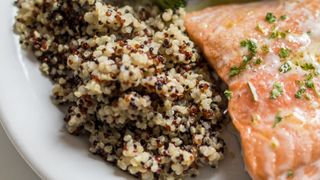
Quinoa is a whole grain full of fibre, protein, plant compounds, and other essential nutrients - including magnesium, vitamin E, folic acid and zinc. Those who are deficient in magnesium in particular may find themselves to be more irritated, nervous, and stressed out than they normally would be, but all of these nutrients offer both mental and physical health benefits.
It's also a great alternative to white pasta, rice, and couscous.
Bulgur wheat
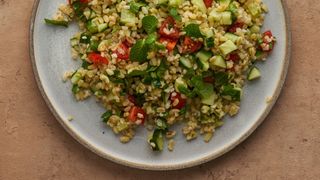
Bulgur wheat is a great alternative to white pasta, rice, couscous, and can be a more favourable texture than quinoa. It also comes packed with cortisol-lowering health benefits, as it's rich in nutrients like magnesium and vitamin B.
While magnesium helps to control the neurotransmitters in the brain linked to mood, B vitamins like niacin and thiamine can support health brain function and sustain your energy levels.
Walnuts
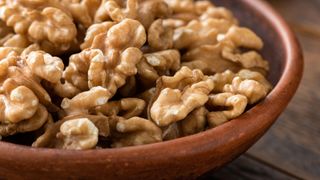
Next time you open a bag of mixed nuts, make sure you get all the walnuts as these nuts are great for helping to lower your cortisol levels.
Walnuts are a good source of an omega-3 fatty acid called alpha-linolenic acid (ALA), which helps to reduce inflammation around the body's major arteries - especially the heart. This lowers the risk of diabetes in turn and can help to protect against the damaging effects of stress.
Flaxseed
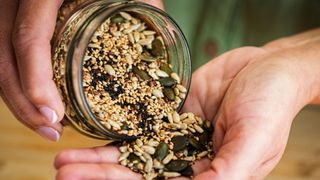
Flaxseed is a great addition to porridge, fruit bowls, salads, and smoothies, being both easily digestible (provided it's ground) and a great source of so many nutrients. For those looking to lower their cortisol levels, it's a particularly good supplement.
Flaxseed has a good amount of fibre and magnesium, which has been proven to contribute to healthy cortisol levels. It also has a great omega-6 to omega-3 ratio, which is important as an imbalance of these two fatty acids can lead to inflammation in the body.
Eggs

Eggs are more than just a breakfast staple. Whether scrambled, fried, or boiled, eggs can be one of the best foods to lower your cortisol levels as they are rich in an amino acid called tryptophan.
Tryptophan helps to create serotonin, a neurotransmitter otherwise known as the 'happy hormone' that's found in the brain, blood, and gut and helps to regulate our mood and stress levels.
Barley grass
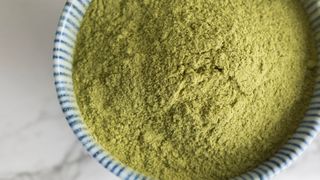
Barley grass is often found as a powder or as an ingredient in a supplement - like greens powder. As a powder, it has a slightly sweet, earthy taste that makes it a great addition to smoothies and shakes.
For those looking to lower their cortisol levels and improve their lifestyle, it's a great supplement food as it's rich in Gamma-Aminobutyric Acid (GABA) - a chemical that works in the brain to regular emotions and reduce symptoms of anxiety.
Chia seeds
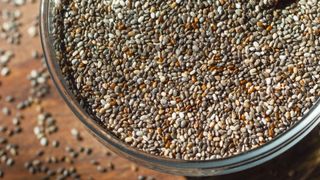
Chia seeds are another easy supplementary food to add to your smoothies, porridge, salads, and regular meals. Don't let their small size fool you though - they come packed with plenty of health benefits.
These small seeds are very nutritious, being rich in magnesium (which has been shown to help improve sleep quantity), selenium, and omega-3s, all of which are beneficial for maintaining healthy hormone levels.
Olive oil

Food rich in monounsaturated fats, such as olive oil, has been found to suppress the release of cortisol. These are otherwise known as 'healthy fats' and include other plant oils too like avocado and canola oil.
However, it's best to have your olive oil fresh rather than use it in cooking to get the most out of it.
Soybeans
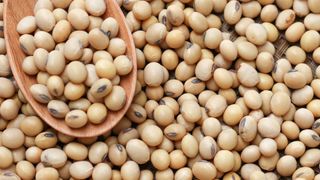
Unless you know someone who regularly eats them, you may not be too familiar with soybeans. Their green cousin, edamame beans, tend to be much more popular. However, these protein-rich beans can help you maintain healthy cortisol levels thanks to their vitamin and mineral-rich components.
So, consider adding a handful of the beans to your salads and soups. Alternatively, you can blitz them up in a food processor with a little garlic, lemon, and olive oil for a great alternative to traditional hummus - with extra benefits.
Onions

Onions - red over white, preferably - are one of the easiest foods to add to your meals and they may help reduce oxidative stress. Other research suggests they boost antioxidant levels in the body - and even help to reduce bone loss in later life.
Onions can also help improve your gut health, which is essential for maintaining good cortisol levels.
Popcorn

Popcorn has natural antioxidant and polyphenol (i.e. plant) compounds that can help to reduce inflammation and aid production of heathy gut bacteria.
Naturally, however, the popcorn should be natural in flavouring and without additional sugars or sweeteners. Adding these in can have the adverse effect and put more stress on the digestive system.

Grace Walsh is woman&home's Health Channel Editor, working across the areas of fitness, nutrition, sleep, mental health, relationships, and sex. She is also a qualified fitness instructor. In 2025, she will be taking on her third marathon in Brighton, completing her first ultra marathon, and qualifying as a certified personal trainer and nutrition coach.
A digital journalist with over seven years experience as a writer and editor for UK publications, Grace has covered (almost) everything in the world of health and wellbeing with bylines in Cosmopolitan, Red, The i Paper, GoodtoKnow, and more.
-
 'I forgive the children who took Brianna's life' - Esther Ghey's remarkable empathy is an example to us all
'I forgive the children who took Brianna's life' - Esther Ghey's remarkable empathy is an example to us allIn the wake of her daughter's murder, Esther Ghey's offers extraordinary forgiveness and calls for change
By Lucy Wigley Published
-
 The Madame Blanc Mysteries puts midlife relationships front and centre - we need more of that on TV
The Madame Blanc Mysteries puts midlife relationships front and centre - we need more of that on TVThe Madame Blanc Mysteries perfectly demonstrates what authentic midlife romance should look like
By Lucy Wigley Published